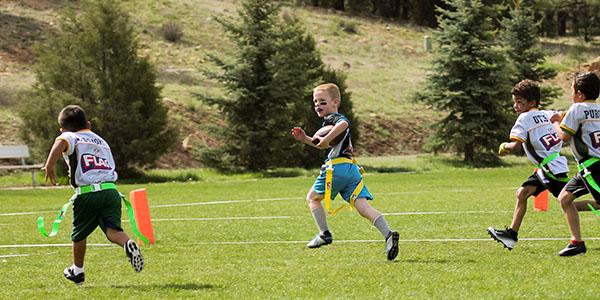
Embrace Mental Training
For some athletes, mental training is an untouched avenue to improve sports performance. Many athletes do not understand mental training and may be skeptical about its value. Learn how parents can help kids embrace mental training.
Even if you as a parent understand the importance of mental toughness in your young athletes, your kids might resist it. If kids do not “buy in” to mental training, they will not reap the benefits it provides. In this article, we teach sports parents and coaches how to encourage their kids to have a strong mental game and the mindsets prevent athletes from embracing mental training.
Some parents say that a big problem is the lack of coaches really explaining what mental toughness is–and how to achieve it. Another parent asks, “How do I get my child to even consider working on her mental game? She feels it is too much pressure.”
Many athletes don’t realize that resources are available to improve their mental game. When under performing or in a slump, most athletes are quick to change other aspects of their performance, such as coaching, equipment, or strategy before realizing that the challenges they face deal with the mental game. We encourage parents and coaches to be proactive and teach kids mental game skills early instead of waiting for kids to develop performance issues and mental game barriers.
How can parents educate their kids about mental game skills? First, start by giving examples of other young athletes who have strong mental game skills. A young basketball player might keep shooting even though he made mistakes early in the game. A young hockey player might stay focused when fans are cheering. A young golfer can learn to react with composure after missing a short putt or hitting a bad shot. Many high- level athletes use mental coaches to help them cope with pressure, improve confidence and focus.
Here are the top 10 myths and attitudes that prevent athletes from embracing mental training:
“I do not need to improve mental toughness — I’m already mentally tough.”
Some young athletes may feel that they are already mentally tough. Mental training is designed to help athletes stay mentally tough. All athletes can tune up on their mental game. Mental training is also a good review for mentally tough young athletes.
“My teammates or coach would think I am weak if I needed mental training.”
Mental training is not a weakness, but a chance to improve young athletes’ mental game and performance. Young athletes show strength by admitting they need to improve their mental game and are willing to better themselves in this regard.
“If my coach does not value sports psychology, then why should I?”
Some coaches might not know much about mental training or how it can help athletes. Young athletes don’t need coaches to support mental training if they believe in it themselves. Help to educate coaches by printing relevant articles from Kids’ Sports Psychology for your athletes’ coaches. You should help your kids understand the benefits of mental training, including improved focus, more stable confidence, and the ability to bounce back after errors. You want to tie this conversation into their main mental game challenges in sports.
When a coach uses practice time to discuss athletes’ mental game, he is sending a clear signal to his athletes about the importance of mental training.
“I am playing well right now. I do not want a mental coach to mess up my momentum.”
For young athletes who are playing well, this is a perfect time to talk about their mental game. Kids can become more aware of the feelings and thoughts associated with playing well. You want them to understand what they are doing well. This will help athletes keep their momentum and reach peak performance more often.
“Performing well is all about hard work and dedication, not mental stuff.”
Hard work and dedication are important, but performance does not always go as planned. Athletes will likely have to deal with distractions or strong adversity. Mental training will help athletes cope with these.
“I don’t want my opponents to find out I need mental help, and use it against me.”
Some kids might not want to work on their mental game because they fear opponents might have an advantage. Mental coaches honor their students’ confidentiality. No one will know about the mental challenges young athletes face. You can reassure your children and teens that information about their challenges will stay within the family as well.
“My coach would bench me if he knew my mind was getting in the way of my game.”
Coaches want young athletes to be open and honest about their mental challenges. Some athletes are not honest about their mental game for fear of losing playing time. In reality, mental training will help athletes improve their performance in competition, which will give them a better chance to contribute to the team and even get more playing time.
“I just need more experience in competition and then I will perform better.”
Young athletes do need to improve their performance. But they also need to be prepared to deal with distractions and adversity in competition. Athletes will not always perform perfectly. Mental training will help kids be better prepared when they don’t perform their best.
“I don’t want to focus on the negative — that’s all a mental coach does.”
Mental coaches do not focus on the negative. They help athletes use their strengths and improve their weaknesses to reach peak performance. Sometimes, mental training is about staying on top of your game and knowing how to keep the momentum going, in addition to addressing athletes’ weaknesses.
Sixty-two percent of coaches who responded to our recent survey said that their top mental challenge is helping promote mental toughness in athletes. Mental toughness is not always well received by young athletes, mostly because of their misunderstanding of its value. Mental training is only valuable if athletes believe it can help them. You’ll need to be armed and ready to discuss your kids’ fears or concerns about improving their mental game.
Related Sports Psychology Articles
- How to Explain Mental Training to Teens
- Mental Training for Young Athletes
- Improve Sports Kids’ Mental Toughness
*Subscribe to The Ultimate Sports Parent Podcast
*Subscribe to Peak Performance Sports on Youtube
Download a free sports psychology report to improve your mental game!
The Confident Sports Kid

When kids lack confidence, they doubt themselves, stop taking risks, play tentatively, and are hard on themselves. As a result, kids often lose their motivation to improve. Ultimately, these barriers keep them from enjoying sports and making the most of their physical talent.
“The Confident Sports Kid” program is actually two programs: one that teaches sports parents how to boost their kids’ confidence, and another that teaches young athletes age 8 to 18 how to improve their self talk, avoid negative thinking, overcome expectations that limit confidence, and much more. The program will help kids boost their confidence in sports and life…and enjoy sports more.
